 New gateway takes shape |
Rutgers-Camden
Department of Sociology, Anthropology and Criminal Justice
Fall 2007 Newsletter
|
|
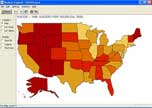

“a valuable addition to our departmental pedagogy”

“Students graduate from our program with skills that can be used immediately on the job or in graduate school.”
|
Dept. Celebrates Ten Years of MicroCase Use
Our department adopted MicroCase as its standard statistical software in 1998. The decision was linked to a belief that the department’s curriculum needed to be moved in a more “skills-based” direction to ensure that sociology and criminal justice majors graduated with marketable strengths. This academic year constitutes the tenth year of employing MicroCase across the curriculum in both disciplines.
The situation before 1998 was much different. As Professor Ted Goertzel notes: “When I began teaching Methods of Research at Rutgers Camden, the computer was in the basement of Armitage Hall. There was just one for the campus, what we now call a “main-frame” computer. There was a room full of card punch machines. We typed lines of code on this machine and they were punched with holes into cards. We then put a “deck” of these cards in a file drawer and the computer staff ran them through the computer. After an hour or so, we got a printout of our results. Usually there were errors and the cards had to be repunched and resubmitted.
“Now the software is much easier to run thanks to the graphic interface (Windows) and we get our results almost instantly. Most students install the Microcase software at home and even submit their assignments through the Internet. We can process much more data and do it more easily. The students are able to focus on the substance of the assignments instead of spending a lot of time learning how to write computer code. We also do much more with graphics which makes the findings easier to understand and communicate.”
Equally importantly, statistical data analyis using MicroCase was introduced into a wide range of other courses, so that both sociology and criminal justice majors are exposed to its use and potential repeatedly in the course of their education at Rutgers-Camden. Professor Jon’a Meyer for one uses MicroCase in all her undergraduate courses, including her Theories of Crime and Delinquency course. She notes that: “While some students grumble about the notion of doing statistics in a theories class, others actually welcome the opportunity to deepen their understanding of the course material in an interactive way. Typically, positive comments from students mention how well they were able to learn about the theories by testing tenets and ideas and a few simply like playing with data to explore theoretical ideas on their own. One student, for example, wrote on the anonymous student evaluations of my course, ‘The MicroCase assignments were really interesting and related right back to the course material.’ In all, I’m quite pleased with how MicroCase and SDA have allowed me to improve my students’ learning in an way that also helps them understand and evaluate basic research information.” A majority of the full-time faculty now use MicroCase in one or more courses, including the two major introductory courses, Criminal Justice in America and Introduction to Sociology. Dr. Meyer judges MicroCase to have been “a valuable addition to our departmental pedagogy,” and Dr. Goertzel observes that “Students graduate from our program with skills that can be used immediately on the job or in graduate school.”
Further information, including online tutorials and examples of MicroCase exercises designed by our faculty, may be found at our MicroCase Resources web page.
|
|
|
Spring 2008 Semester Pre-Registration Starts November 4th
Read this before you register!
Pre-Registration for the Spring 2008 Semester begins on November 4th. All students are strongly encouraged to see their departmental advisor in planning their schedule, especially those who expect to graduate in May.
New Major Advising System In Effect: Since January, a new departmental advising system has been in effect. Both Criminal Justice and Sociology majors are now assigned an individual advisor. If you don’t know who your advisor is, check the online list of advising assignments (Excel file). If you don’t find your name there, see department secretary Sherry Pisacano in the departmental office to get one assigned. (Students are temporarily reassigned when their faculty advisor is on sabbatical leave.)
Degree Navigator (click here for student access) remains a great tool, but students combining a major and minor in the department should be sure to consult their advisor–DN sometimes makes mistakes in this case. Be sure that you have the required combined credits.
Preregistration Tips and Reminders:
All Sociology and CJ majors should take Methods and Techniques of Social Research (920:301) as soon as possible. This course is a prerequisite for a number of upper-level courses, and knowledge of MicroCase and the basics of data analysis are increasingly expected in all upper-level courses. Note: the methods course also fulfills the second math requirement in the CCAS curriculum.
Dr. Goertzel’s spring 2008 Communication class (920.341) counts both as a sociology elective and as a “writing intensive” course in the college curriculum.
Selected Urban Studies courses can count as one elective in the sociology major. Check the sociology major webpage for details.
Many of your questions about advising may be answered by consulting our department’s Sociology Advising Page and our Criminal Justice Advising Page.
New Courses include:
Winterim: Museums and Culture. 070:485. 12/21/07 F, 1/2/08-1/17/08 M,Tu,W,Th 6:00pm-9:40pm. Taught by Patrick McCarty. Click here for detailed description.
Spring Semester: Children and Consumer Culture. 920:346. MW 1:20-2:40. Taught by Prof. Dan Cook, a sociologist who has joined the Department of Childhood Studies. Counts as sociology elective. Click here for detailed description.
Quick Access to Course Information:
|
Winterim Session
|
Spring 2008 Dept. Courses
|
|
| |
Two Year Dept Schedule
|
|
|

15 decks high, Explorer of the Seas towers over Miami’s port
 Globalization at sea means a global crew without labor laws or most other regulations Globalization at sea means a global crew without labor laws or most other regulations
|
BBC Takes Prof. Wood on Caribbean Cruise to Explore
“The Price of Fun”
 Ship anchored off of Labadee, Haiti Ship anchored off of Labadee, Haiti
(a “private island” that is not) |
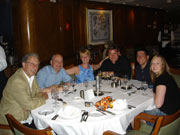 A tough assignment: Prof. Wood with BBC producer Jolyon Jenkins and other cruisers A tough assignment: Prof. Wood with BBC producer Jolyon Jenkins and other cruisers |
How’s this for a tough assignment? In April, BBC radio producer Jolyon Jenkins invited Prof. Robert Wood to accompany him on a six-day Caribbean cruise on board Royal Caribbean’s Explorer of the Seas, one of the world’s largest cruise ships. Prof. Wood has published numerous articles on the cruise Industry, including Globalization at Sea: Caribbean Cruise Tourism; Cruise Ships: Deterritorialized Destinations; and Cruise Ships: A Paradigmatic Case of Globalization? Jenkins was particularly interested in Prof. Wood’s view that cruise ships constitute a particularly pure case of neoliberal globalization, and Jenkins deliberately chose a cruise that stopped at Labadee. While Labadee is often marketed as a “private island,” it is in fact part of Haiti, the poorest country in the Western hemisphere. The trip was part of the production of a new BBC radio series entitled “The Price of Fun.” The show that includes Prof. Wood (after the first section on Alaska) may for a limited time be accessed here (requires RealPlayer). The show ends with Prof. Wood’s observation that this unique case of unfettered globalization constitutes a “quite scary world to look at.”
|
|
 Prof. Coe sees children’s drawings as a form of cultural expression Prof. Coe sees children’s drawings as a form of cultural expression
|
Prof. Coe Receives NSF Grant to Study Transnational Families
Prof. Cati Coe has received a two-year grant from the Cultural Anthropology program at the National Science Foundation (NSF) to support her research on the lives of Ghanaian immigrant families. NSF grants to anthropologists are rare, so this is a special honor. Dr. Coe is particularly interested in how the traditional practice of child fosterage (in which a child is raised by adults other than his or her birth parents) is being used by Ghanaian parents who have traveled to the U.S. to live and work. NSF will be supporting one stage of this longer project, in which Dr. Coe will be doing a household survey in one small town in southern Ghana, to determine how the child-raising practices of transnational migrants differ from urban migrants. If you are interested in knowing more about how immigration impacts family arrangements, you might consider taking Dr. Coe’s anthropology course in the spring on Immigration and Families. Dr. Coe is a member of the Working Group on Childhood and Migration, which is hosting an interdisciplinary Conference on Childhood and Migration in Philadelphia next June.
|
 Jason Wilson engages in simulated experience of aging and disability at the checkout counter Jason Wilson engages in simulated experience of aging and disability at the checkout counter |
NPR Reports on Soc. of Aging Course Simulation Exercise
Prof. Monika Wood’s innovative Sociology of Aging course simulation exercises were recently discussed by editor and author Jason Wilson on National Public Radio (NPR). The Talk of the Nation show on Teaching the Young to Emphathize with the Oldaired on October 11, 2007. In it, Wilson recounts how, with corn kernels in his shoes, tight bandages around his knees, plugs in his ears, a cotton ball in one nostril, and breathing through a straw, he developed a new appreciation of people who cope daily with pains, stiff joints, and poor eyesight and hearing.
In addition to the NPR radio show, available online, Wilson has also described his experience in an article, “Old Like Me,” in the online magazine, The Smart Set, where he quotes Monika Wood from an article she coauthored in Gerontology and Geriatrics Education: “It brings home the meaning of functional impairments to healthy, young undergraduate liberal arts students in a much more effective way than the best written chapter in a text or the most brilliant lecture could hope to achieve.”
|
 Patrick McCarty Patrick McCarty |
Prof. McCarty Tapped for Anthropology Text Website Creation
Prof. Patrick McCarty, an adjunct faculty member of the department, recently completed work on McGraw-Hill’s Online Learning Center, a website created to assist students and instructors who use McGraw-Hill’s anthropology texts. Professor McCarty worked on websites for two texts: John Relethford’s The Human Species: An Introduction to Biological Anthropology, and Michael Park’s Introducing Anthropology: An Integrated Approach. For the student websites, he revised and updated virtual explorations, exams and quizzes, chapter overviews and outlines, and learning objectives. For the instructor side of the website, he created new PowerPoint presentations for each chapter. McGraw-Hill has cited Professor McCarty’s contribution and Rutgers-Camden is mentioned on the website. The virtual explorations appear in the print edition as well. Feel free to explore these two sites, which include audio and video files as well.
|
|


|
Photographs from Student Film Project Illustrate
Code of the Street Text
One of the most successful student projects in our department involved making a film on Germantown Avenue in Philadelphia to illustrate key themes in Elijah Anderson’s award-winning Code of the Street, a book used in the department’s social stratification class, among others. The film was presented by students James Flatley and Etienne Jackson at the Eastern Sociological Society in the spring of 2005, and has remained available in several formats at the film website. Requests for the DVD version continue to come in almost weekly, indicating that the film is used in classes all over the country.
Recently, Designer/Builder: A Journal of the Human Environment reprinted the section of Anderson’s book on Germantown Avenue, and received permission to use a number of the still photographs taken by the students and Prof. Wood as part of the film project. Ten of these photographs (in black and white, conforming to the journal’s format) illustrate the text in the October 2007 issue. Designer/Builder is distributed to all members of Architects/Designers/Planners for Social Responsibility. Students who would like a free copy may pick one up on the fireplace mantle in the student lounge in the sociology building.
|
 These books and many others are currently available for free These books and many others are currently available for free |
Free Books Available in Sociology Lounge!
The books in the bookcases in the student lounge on the second floor of the Sociology building are available free to those who will use them! Most are contributed by faculty members who no longer need them, and there is a an excellent mix of sociology, anthropology and criminal justice texts and monographs. The texts particularly make excellent reference sources for many courses (but be sure to cite them if you use them for your assignments). There are books on specialized topics as well–right now there are a particularly large number of books on Japan, for anyone interested in that fascinating and important country. The selection keeps changing, so it’s a good idea to check it out periodically. The price is just right!
|
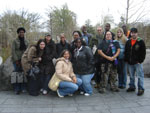 DC Trip Group Portrait DC Trip Group Portrait |
Red & Black Class Tours Museum of the American Indian In April 2007, Dr. Hazzard-Donald’s special topics class, The Red and the Black: American Indians and African Americans in the North American Environment, visited the National Museum of the American Indian in Washington, D.C. Dr. Hazzard-Donald said the opportunity to experience the exhibits on native history, beliefs and contemporary life was a wonderful complement to the course. During the lunch break at the museum’s cafeteria, students selected food from a variety of traditional and updated American Indian cuisine including buffalo cheese burgers, dishes of corn, squash, soups and stews, and even a raw fish selection. Students proclaimed the trip a great success and a great learning experience. Funding from the African American Studies program and the department made this unique and valuable experience possible.
|
 |
Criminal Justice Major Offered Off-site at ACCC
For the first time in the department’s history, one of our majors is being offered off campus. Starting this semester, students will be able to earn a bachelor’s degree in criminal justice by taking courses offered by Rutgers on the campus of Atlantic Cape Community College (ACCC) in Mays Landing. The program is targeted to students who have earned an associate’s degree and would like to obtain their bachelor’s closer to home in southern New Jersey. The program is starting small, but students are very enthusiastic about the terrorism course that’s being offered this semester, taught by Dr. Mark Anarumo, who also happens to be an Air Force Colonel with extensive counter-terrorism training (watch for the same course in Camden this coming summer!). In the spring, we’ll be offering “The Poor, Minorities and Justice,” taught by Professor Baron. Course offerings will expand as the program develops.
|
|
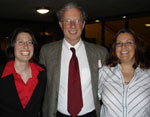
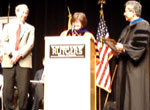
|
Professor Wood Receives Prestigious Teaching Award
Exceptional. Wonderful. Great. Dedicated. Brilliant. All these and more are adjectives that students have used to describe Professor Robert Wood. They are representative of the accolades that he receives regularly from students in his courses, who consistently appreciate his enthusiasm, careful course preparation, innovative use of Web-based and other instructional technologies, and his openness and availability to students. In May, the university recognized these qualities when it awarded the prestigious Lindback Distinguished Teaching Award to Professor Wood, in recognition of his lifetime achievements in teaching and his commitment to undergraduate education. The Lindback Award is simply the most recent of Professor Wood’s teaching honors, which also include the Provost’s Award for Teaching Excellence in 1996, the Warren I. Susman Award for Excellence in Teaching in 2000, and the Outstanding Contribution to Instruction Award presented by the American Sociological Association in 2002. If you’ve never had the opportunity to take a course with Professor Wood, you may want to register for one of his courses next year, after he returns from his sabbatical.
At left: Prof. Wood with Masterson Awardees Kristin Curtis and Linda Anderson, and with Margaret Marsh and Michael Palis. Click here for a streaming video of Acting-Provost Margaret Marsh presenting the award.
|
|
|
Departmental Web-Enhanced Curriculum Offers Unique Features To Support Students in Their Course Work
If you’re not yet familiar with it, we recommend exploring our website, which provides a broad array of resources to assist you in finding the information you need and in doing well in your courses. As the illustration below shows, the website is divided into two sections, the departmental homepage and the web-enhanced curriculum, each with its own set of resource links. Check it out! There are resources to help you do well in your courses!
|
Departmental Homepage
Online Syllabi & Course Web sites
Masters Program in Criminal Justice
Current Newsletter
Faculty
Major Requirements
Minor Requirements
Course Schedule
Departmental Mailing List
Masterton Award
Advising FAQs
Poster Session Album
Faculty Resources
|
Web-Enhanced Curriculum HomepageOnline Syllabi & Course Web sites Masters Program in Criminal Justice Current Newsletter Plagiarism Policy and Guidelines Citation Guidelines Table and Graph Format Library Resources Online MicroCase Resources Online Research Tutorials and Videos Virtual Tours Recommended Web sites Writing in the Discipline Student Research Opportunities Streaming Audio and Video Project
|
You can learn more about our web-enhanced curriculum in the online journal, Innovate,which included an article about our department in its first issue by Prof. Wood, entitled“Scaling Up: From Web-Enhanced Courses to a Web-Enhanced Curriculum.“ To access it, you must register for free at the Innovate site (just unclick the box about promotions if you don’t want to receive them). It’s a good way to learn about how the department is using technology to enhance teaching and learning and what its website has to offer you.
Dept. E-Mailings: Periodic department mailings about events and departmental news are sent to all sociology and criminal justice majors. To receive them, be sure that you have declared sociology or cj as your major and be sure that the email address you wish to use is registered at the Rutgers student directory. The list is more fully described at the department’s E-Mailing List web page
|
April 1, 2008 . Contact Jane Siegel with comments or questions.
|